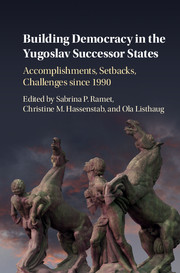 Building Democracy in the Yugoslav Successor States
Building Democracy in the Yugoslav Successor States Book contents
- Frontmatter
- Dedication
- Contents
- List of Boxes
- List of Figures
- List of Tables
- Notes on Editors
- Notes on Contributors
- Preface
- Part I Introduction and Theory
- Part II Country Studies
- 7 Building Democracy in Serbia: One Step Forward, Three Steps Back
- 8 Building Democracy in Croatia since 1990
- 9 A Durable Oligarchy: Bosnia and Herzegovina's False Post-War Democratic Transition
- 10 Liberal Democracy in Slovenia: From Seventh Heaven to the Lobby of Hell in Only Two Decades?
- 11 Macedonia's Post-Yugoslav Reality: Corruption, Wiretapping, and Stolen Elections
- 12 Building Democracy in the Western Balkans: The Case of Kosovo
- 13 The Trajectory and Parameters of Democratic Transition in Montenegro
- 14 Building Democracy in Vojvodina
- Part III Conclusion
- Further Reading
- Index
8 - Building Democracy in Croatia since 1990
from Part II - Country Studies
Published online by Cambridge University Press: 25 May 2017
- Frontmatter
- Dedication
- Contents
- List of Boxes
- List of Figures
- List of Tables
- Notes on Editors
- Notes on Contributors
- Preface
- Part I Introduction and Theory
- Part II Country Studies
- 7 Building Democracy in Serbia: One Step Forward, Three Steps Back
- 8 Building Democracy in Croatia since 1990
- 9 A Durable Oligarchy: Bosnia and Herzegovina's False Post-War Democratic Transition
- 10 Liberal Democracy in Slovenia: From Seventh Heaven to the Lobby of Hell in Only Two Decades?
- 11 Macedonia's Post-Yugoslav Reality: Corruption, Wiretapping, and Stolen Elections
- 12 Building Democracy in the Western Balkans: The Case of Kosovo
- 13 The Trajectory and Parameters of Democratic Transition in Montenegro
- 14 Building Democracy in Vojvodina
- Part III Conclusion
- Further Reading
- Index
Summary
The focus of this chapter is on the shape of democratic developments in Croatia. In the past quarter of a century much has been achieved in respect to democratic processes but far less than was expected at the beginning. Croatia started its path to democracy and free society in an atypical way despite similarities with other post-communist countries. At the time when Croatia's democratic parties were being founded, their proponents didn't have any experience with democratic politics and so most of the party programs – which resembled catalogues of wishes – did not focus on questions of democracy; instead, the national question overshadowed the whole process. It was partially burdened from outside and could not be easily evaded. Nevertheless, the impression one could reach in those days was that the majority of people wanted in the first place a democratic future in a free country. It seems that the new parties did not echo this disposition in civil society that, indeed, could not find a way to articulate their views in any other way.
Hesitant Steps toward Liberal Democracy
The first party to be formed was the Croatian Social Liberal Union (HSLS), which came into being on 20 May 1989 and was initially more devoted to democratic principles and themes than the parties that emerged later. For these reasons I shall start my survey by focusing on this party. Unfortunately, from its very beginning the national question burdened the discourse and, as a consequence, the development of that party's politics. Eventually, after severe controversies, the Social Liberal Union became one of the H-parties, “H” standing for “Croatian,” which means that national issues overshadowed all other political problems just as they did among other national parties. The HSLS did, nevertheless, play an important role in the young democracy in Croatia, first as the most serious opposition party in the 1990s and afterwards as a part of the coalition that succeeded the Croatian Democratic Union (HDZ) in power in 2000. The fact that the initial liberal impulses could not be established but had to be blended with so-called national interests can serve as an indication as to the shape of Croatian elites.
- Type
- Chapter
- Information
- Building Democracy in the Yugoslav Successor StatesAccomplishments, Setbacks, and Challenges since 1990, pp. 192 - 215Publisher: Cambridge University PressPrint publication year: 2017
- 1
- Cited by


